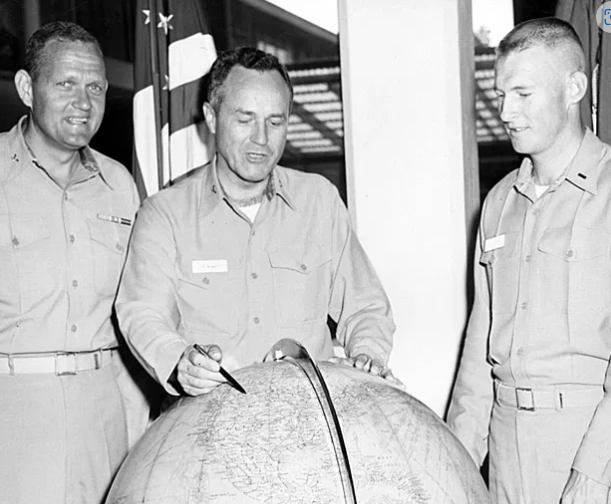Our Arklahoma Heritage: Sid McMath- War hero, political trailblazer, and champion of progress
- Dennis McCaslin

- Jun 12
- 3 min read



Sidney Sanders McMath was a U.S. m, attorney and the 34th governor of Arkansas from 1949 to 1953.
In defiance of the state's political establishment at the time, he championed rapid rural electrification, massive highway and school construction and the building of the University of Arkansas for Medical Sciences.
He championed strict bank and utility regulation, repeal of the poll tax, open and honest elections, and broad expansion of opportunity for black citizens in the decade following World War II.
From his early years in Magnolia to his tenure as the 34th governor of the state, McMath’s life was defined by hard work, leadership, and an unwavering commitment to progress.

Born on June 14, 1912, in a dogtrot cabin in Columbia County, McMath was raised in a family that valued hard work and determination.
His father, Hal Pierce McMath, and mother, Nettie Belle Sanders McMath, instilled in him a strong sense of duty.
Anne McMath, Hal Pierce McMath's second wife, shot and killed McMath's father in 1947. In his memoir, Promises Kept Sid McMath describes the incident, noting that his father had become an "enraged alcoholic" at the time.
The shooting was investigated, with a special grand jury convened to examine the circumstances, but no further details on the legal outcome are provided in available sources
His grandfather, Sidney Smith McMath, had been a sheriff killed in the line of duty, setting a precedent of service that Sid would follow.

McMath’s military career was nothing short of extraordinary. He served in the United States Marine Corps during World War II, rising to the rank of Major General. His leadership in the Asiatic-Pacific Campaign earned him prestigious honors, including the Silver Star and Legion of Merit.
His time in the military shaped his approach to leadership, instilling discipline and a deep commitment to justice.
After the war, McMath established his law practice in Hot Springs, where he quickly gained a reputation for tackling corruption and advocating for fairness. As prosecuting attorney for Montgomery and Garland counties, he took on major cases, including the prosecution of Mayor Leo McLaughlin, a figure associated with deep-seated political corruption in Hot Springs.

His efforts not only reshaped local governance but also set the foundation for his later political career. During this period, Hot Springs was McMath’s home and professional base, serving as the launching pad for his reform-driven political trajectory.
In 1946, McMath rallied returning veterans to form the “G.I. Slate”, a movement that won every public office in Montgomery County. His success propelled him to the governorship in 1949, where he championed rural electrification, highway expansion, school construction, and civil rights reforms.
He remained loyal to President Harry S. Truman, opposing segregationist movements and advocating for fair elections.
McMath’s tenure as governor was marked by ambitious infrastructure projects and progressive policies:
Rural Electrification: He accelerated efforts to bring electricity to rural Arkansas, improving the quality of life for thousands.
Highway Expansion: His administration launched a massive highway construction initiative, modernizing Arkansas’s transportation network.
Education Investment: He prioritized school construction, ensuring better facilities for students across the state.
Medical Advancements: He spearheaded the establishment of the University of Arkansas for Medical Sciences, enhancing healthcare access.
Election Integrity: He fought for open and honest elections, advocating for the repeal of the poll tax to make voting more accessible.
Civil Rights Advocacy: McMath expanded opportunities for Black citizens, opposing segregationist policies and supporting fair treatment in public services.
McMath was a vocal opponent of segregation, standing against the Dixiecrat movement and later challenging Governor Orval Faubus during the 1957 Little Rock school crisis. His commitment to racial equality was evident in his push for fair elections and expanded opportunities for Black Arkansans.
His infrastructure improvements were not just about roads and buildings—they were about economic empowerment, ensuring that all citizens, regardless of race, had access to modern amenities and opportunities.
After leaving office in 1953, McMath became one of the nation’s foremost trial lawyers, representing thousands in precedent-setting cases. His legal career was marked by a commitment to justice, mentoring generations of attorneys and fighting for the rights of the injured.

Sid McMath passed away on October 4, 2003, at the age of 91, in Little Rock. He was laid to rest at Pinecrest Memorial Cemetery in Saline County.
His autobiography, Promises Kept, published in 2003, chronicled his war years and political career, ensuring his legacy would endure.


